Reading for this week:
•Paxton and Hessler, Europe in the Twentieth Century, Chapters 1, 2
Emmeline Pankhurst,My Own Story (1914), excerpt
F. T. Marinetti, "Manifesto of Futurism" (1909)
IMPERIAL EUROPE
AT ITS HEIGHT
INTRODUCTION: ON THE EDGE OF THE ABYSS
I. WHY DIDN’T THEY SEE IT COMING? THE HUNDRED YEARS’ PEACE, 1815-1914
II. A QUICK TOUR OF THE GREAT POWERS
III. LIBERAL VISIONS
IV. DISSATISFIED CHALLENGERS
V. NATIONALISM AS A DISPUPTIVE FORCE
VI. REBELLIOUS ARTISTS (AND ANXIOUS LIBERALS)
World War I (“The Great War”) 1914-1918
World War II 1939-1945
defeat of Napoleon (1814/15)
mid-19th century wars (1854-1871--national unification of Germany, Italy
revolutions of 1848
reasons why Europeans didn't see the catastrophes ahead:
1. historical expectations: the "hundred years' peace," 1815-1914
2. diplomacy: defensive alliances (which then become entagling alliances)
3. self-confidence about European superiority
(and perhaps 4: some wanted war; they underestimated what it would mean)
pre-1914 alliance systems:
Triple Entente (Great Britain - France – Russian Empire)
Triple Alliance (German Empire – Austro-Hungarian Empire - Italy)
Ottoman Empire
Europe's "Great Powers" and European alliances on the eve of WWI:
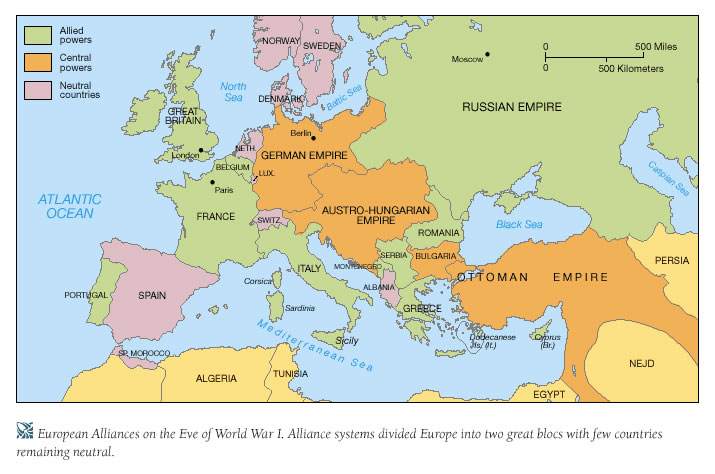
The original can be found at:
http://wps.ablongman.com/wps/media/objects/262/268312/art/figures/KISH_26_586.gif
"The inhabitant of London could order by telephone, sipping his morning tea in bed, the various products of the whole earth, in such quantity as he might see fit, and reasonably expect their early delivery upon his doorstep; he could at the same moment and by the same means adventure his wealth in the natural resources and new enterprises of any quarter of the world, and share, without exertion or even trouble, in their prospective fruits and advantages…But most important of all, he regarded this state of affairs as normal, certain, and permanent, and any deviation from it as aberrant, scandalous, and avoidable." [emphasis added]
--John Maynard Keynes, The Economic Consequences of the Peace (1920)
Africa in 1914: European colonies and spheres of influence
This is one way to understand what Keynes is saying about Europeans' feelings of superiority and an ability to command the resources of the world:
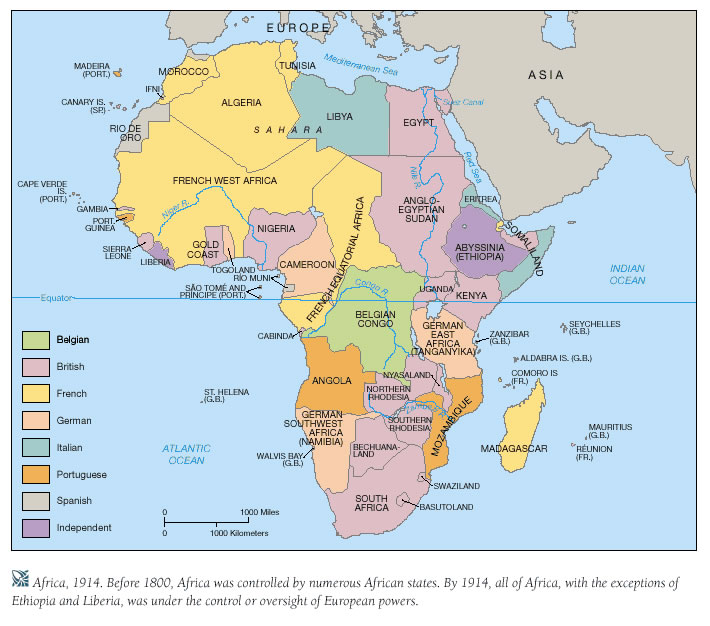
The original can be found at:
http://wps.ablongman.com/wps/media/objects/262/268312/art/figures/KISH_25_575.gif
The Great Powers
1. Great Britain 2. Germany 3. France 4. Austria-Hungary 5. Russia
you should begin to learn the distinctive features of each of these states (or regions of Europe, since the land empires will collapse by the end of WWI)
note: all are empires, some are also nation-states
some have overseas colonial empires, others are European land empires
liberalism
“classical,” or 18th-19th century liberalism
the twentieth century as the crisis of liberalism
•definition: the good of the individual is the highest good in society.
consequence:
social and political arrangements should be made to promote that good and be judged by their ability to do so.
•underlying assumption: an optimistic belief in the power of human reason to understand the world and promote individual flourishing and social progress.
• policy consequences:
1. for politics: limited government (civil liberties, constitutions, parliamentary government)
2. for economics: laissez-faire capitalism (free, self-regulating market)
3. for society and culture: belief in education and the public sphere (press, voluntary associations)
4. for knowledge: modern science as a progressive force
Note: nineteenth-century liberals disagreed among themselves about political democracy
1890-1914 as the first wave of globalization (reread the Keynes quote above)
Norman Angell, The Great Illusion (1910): a guarded case for liberal optimism
1. wars of conquest are futile and self-defeating
2. economic interdependence makes prolonged war impossible
bottom line: militarism is obsolete
World colonial holdings, ca. 1900

The original can be found at:
http://wps.ablongman.com/wps/media/objects/262/268312/art/figures/KISH_25_578.gif
Dissatisfied Challengers
•democrats
(but what is democracy? and what is needed to secure it? a recurring theme in this course)
•socialists (especially Social Democratic parties and Labour party in GB)
•right-wing populists (proto-fascist, localized and sporadic)
•feminists: see Emmeline Pankhurst,My Own Story (1914)
•emigrants (massive out-migration from southern and eastern Europe)
•dissatisfied nationalities (e.g. Irish, Poles, Czechs, and Serbs--see below)
Socialism (or Social Democracy)
Second International (association of Socialist parties)
SPD: German Social Democratic Party / 1912 electoral turning point
"scientific socialism" (Marx and Engels):
goals: 1. end capitalist exploitation of workers; 2. create a planned economy based on social ownership of the means of production; 3. solidarity among workers
means: subject of an ongoing debate among socialists
class struggle? revolution? or evolutionary socialism though gradual political and economic gains?
note that there are also non-Marxist forms of socialism--syndicalism and anarchism
Right-wing populism ("proto-fascist" movements)
before WWI, local and temporary movements (contrast w/socialism)
characteristics:
1. intense nationalism
2. motivated by ethnic rivalry and hostility ("backlash"--e.g. pan-Germanism)
3. anti-Semitic rhetoric and appeal
4. authoritarian political solutions
5. but a rebellious tone and disruptive tactics
6. support: lower middle class
Feminism
first-wave feminism: equal political, legal, civil rights
socialist feminism (problems of working-class women)
e.g. Great Britain: WPSU (Women's Social and Political Union)--
Emmeline, Christabel, and Sylvia Pankhurst
Nationalism
two big questions about nationalism:
1. Why was nationalism such a powerful and dangerous force in the first half of the twentieth century? What were its effects?
2. Why does nationalism seem to have declined in Europe since the middle of the century?
elements of modern nationalism
1. nationality = belief in an identity, defined by culture (language, traditions, ethnicity) or by “race”
2. statehood = belief that a nationality has the right to political self-determination in a nation-state
3. territory = belief in the right of the nation state to control a territory that includes (all?) the members of the nationality
4. identification = intense personal identification with and loyalty to the national group and/or the nation-state (sacrifice/die/kill)
5. rivalry = does all this imply conflict among nation-states?
Nationalism as a disruptive force on the eve of World War I:
1. as fuel for “Great Power” rivalries:
a. France vs. Germany (revenge for Franco-Prussian war?)
b. Austria-Hungary vs. Russia (expansion into Balkans in southeastern Europe w/collapse of Ottoman empire's power)
c. Great Britain vs. Germany (control of seas, arms race)
2. as the cause of unsatisfied nationalities: for example,
•Irish (part of United Kingdom)
•Poles (divided among German, Austro-Hungarian, and Russian empires)
•Czechs (inside Austro-Hungarian empire, but without the self-determination rights of Hungarians)
•Serbs (have their own nation-state, but ethnic Serbs live in other, bordering states, esp. Bosnia)
and many others
map: linguistic groups in Austria-Hungary:
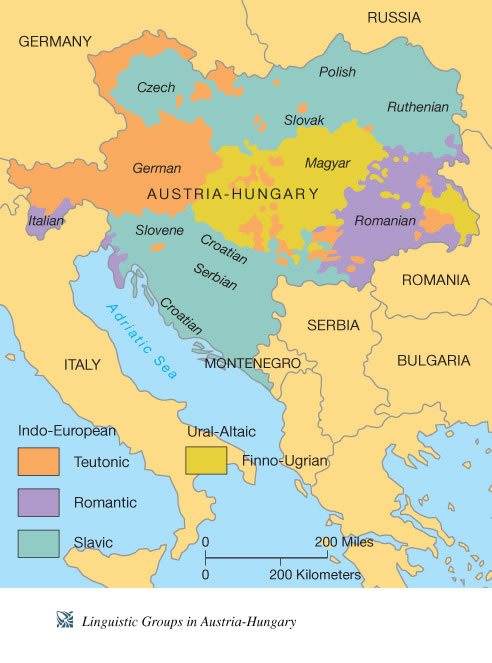
The original can be found at:
http://wps.ablongman.com/wps/media/objects/262/268312/art/figures/KISH535.jpg
Italian Futurists / avant-garde artists
see F. T. Marinetti, "Manifesto of Futurism" (1909)
as a response to theories of social and "racial" degeneration
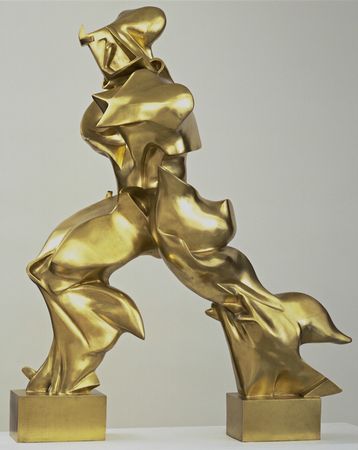
Umberto Boccioni, "Unique Forms in Space" (1913)
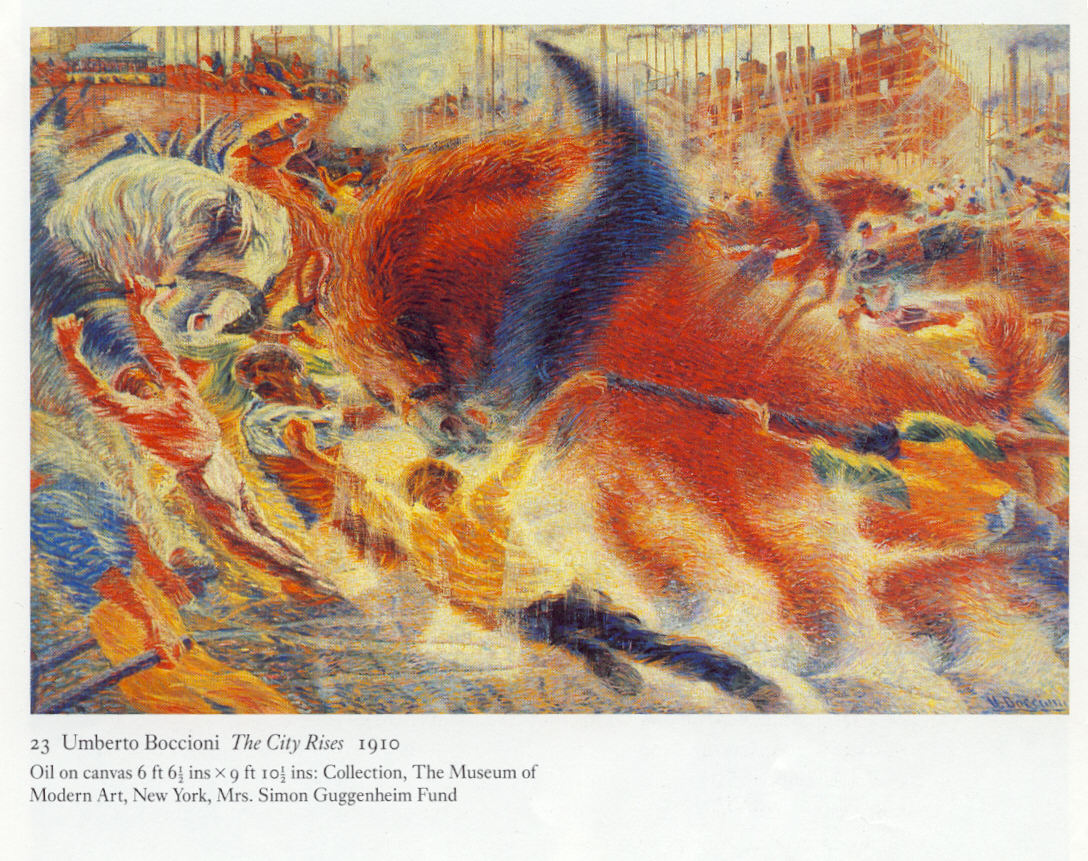
Marinetti, MANIFESTO OF FUTURISM (1909)
We intend to sing the love of danger, the habit of energy and fearlessness.
Courage, audacity, and revolt will be essential elements of our poetry.
Up to now literature has exalted a pensive immobility, ecstasy, and sleep. We intend to exalt aggresive action, a feverish insomnia, the racer’s stride, the mortal leap, the punch and the slap.
We affirm that the world’s magnificence has been enriched by a new beauty: the beauty of speed. A racing car whose hood is adorned with great pipes, like serpents of explosive breath—a roaring car that seems to ride on grapeshot is more beautiful than the Victory of Samothrace.
We want to hymn the man at the wheel, who hurls the lance of his spirit across the Earth, along the circle of its orbit.
The poet must spend himself with ardor, splendor, and generosity, to swell the enthusiastic fervor of the primordial elements.
Except in struggle, there is no more beauty. No work without an aggressive character can be a masterpiece. Poetry must be conceived as a violent attack on unknown forces, to reduce and prostrate them before man.
We stand on the last promontory of the centuries!… Why should we look back, when what we want is to break down the mysterious doors of the Impossible? Time and Space died yesterday. We already live in the absolute, because we have created eternal, omnipresent speed.
We will glorify war—the world’s only hygiene—militarism, patriotism, the destructive gesture of freedom-bringers, beautiful ideas worth dying for, and scorn for woman.
We will destroy the museums, libraries, academies of every kind, will fight moralism, feminism, every opportunistic or utilitarian cowardice.
We will sing of great crowds excited by work, by pleasure, and by riot; we will sing of the multicolored, polyphonic tides of revolution in the modern capitals; we will sing of the vibrant nightly fervor of arsenals and shipyards blazing with violent electric moons; greedy railway stations that devour smoke-plumed serpents; factories hung on clouds by the crooked lines of their smoke; bridges that stride the rivers like giant gymnasts, flashing in the sun with a glitter of knives; adventurous steamers that sniff the horizon; deep-chested locomotives whose wheels paw the tracks like the hooves of enormous steel horses bridled by tubing; and the sleek flight of planes whose propellers chatter in the wind like banners and seem to cheer like an enthusiastic crowd.
_____________________________
anxious liberals
Max Weber, The Protestant Ethic and The Spirit of Capitalism
modernity as an "iron cage" devoid of meaning and values
the rationalization of the modern world
Sigmund Freud, The Interpretation of Dreams
psychoanalysis / the unconscious / sexuality